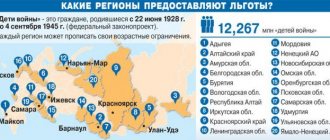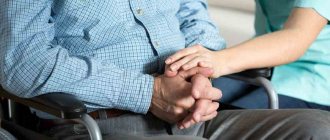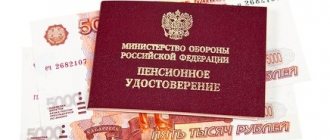Disability is a special state of human health when he cannot fully or partially live a full life, work, or study.
People with such health problems are usually called disabled or people with disabilities.
In Russia, a patient receives this status after passing a special examination, when the level of his ability to work and vital activity is assessed by both doctors and lawyers. What diseases are included in the list of 1st disability group?
Group I disabled status
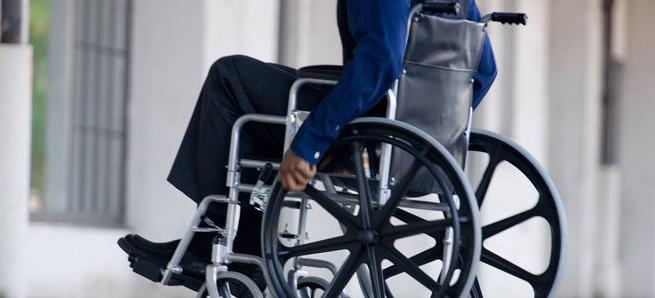
Disability is assigned based on the decision of a medical and social examination. Such a decision is based on some serious illness, congenital pathology or injury that caused a serious health disorder. Depending on the severity of such a disorder, a person is assigned one of 3 disability groups.
The first disability group
is the most severe .
It is assigned to persons who have lost the ability to independently care for themselves at home, without the assistance of assistants. The procedure for assigning it and the benefits due to such citizens are prescribed in the following legislative regulations:
- Federal Law No. 181;
- Federal Law No. 166;
- Government Decree No. 95.
Elena Smirnova
Pension lawyer, ready to answer your questions.
Ask me a question
Due to severe impairment of health, disabled people of group I belong to the most vulnerable segments of society. Therefore, they are entitled to special protection from the state.
All measures provided to them conditionally divided into the following categories:
- Economic assistance. This includes tax preferences and pension benefits.
- Legal . Legislative protection of the rights of people with disabilities by government agencies.
- Medical . Ensures the right of a disabled person to be provided with the full amount of required medical care and means of social rehabilitation.
Types of disability
Social guarantees for citizens with disabilities are enshrined at the legislative level. There are two types of social security for disabled people:
- Social help. All payments falling into this category are temporary. This also includes the provision of basic necessities and food.
- Social security content. This category includes all types of pensions, preferential sanatorium and resort treatment, and some types of medical services.
The implementation of all types of social security is guaranteed by Federal Law No. 181-FZ of November 21, 1995 and other legislative acts. A pensioner, after being assigned a disability, is entitled to certain payments:
- Old age pension. The citizen will continue to receive it after changing his social status.
- Monthly social benefits for disability. The size of the pension depends on the disability group. The largest pensions are awarded to disabled people of group 1 and disabled children.
- Monthly cash allowance (MCB). Its size is also set in accordance with the disability group.
- Cash compensation for refusal of a set of social services (NSS). It is accrued along with the EDV.
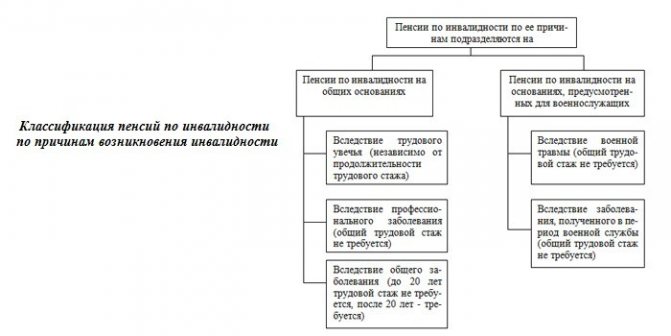
Group assignment
The patient must undergo a medical and social examination (MSE). Based on the result of the examination, a citizen with disabilities is assigned one of three disability groups:
- Group 1: completely unemployed, the citizen needs constant accompaniment and care;
- Group 2: working and non-working;
- Group 3: working.
When assessing disturbances in the functioning of the body and a person’s ability to work, 4 degrees of disability are distinguished:
- 1st degree. Disruptions in the body's functioning are minor, the ability to work remains fully intact. Examples of diseases for which this degree of disability is established: stage 2-3 encephalopathy, stage 2 hypertension.
- 2nd degree. Moderate disturbances in the functioning of organs.
- 3rd degree. Health problems are severe, the citizen cannot work.
- 4th degree . Serious disturbances in the functioning of the entire body; the patient needs constant assistance.
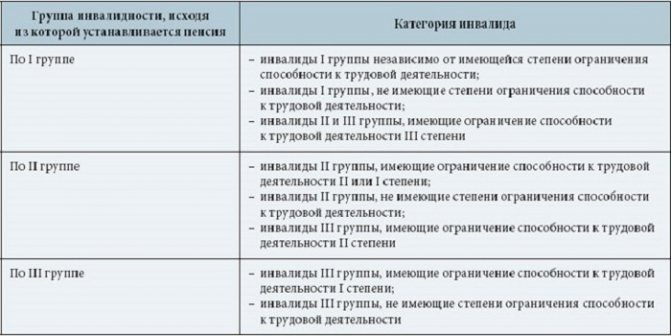
- 11 best folk remedies for heartburn and acidity
- How coronavirus can weaken the ruble
- Quilling for children
Passing a medical and social examination
Disability is established by decision of a medical and social examination (MSE). An examination is a procedure for assessing the health status of an individual and determining his needs for social protection. The commission includes 3 doctors, one of whom is a pharmacologist. The profile of the other two doctors depends on the citizen's disease. Algorithm for passing the examination:
- Receiving a referral to ITU. The pensioner visits the attending physician, who gives him a referral for a medical examination. Based on the examination results, a referral for examination is issued.
- Visiting the ITU office, submitting an application for examination. For bedridden pensioners, all documents and certificates are submitted by their official representative. Such patients undergo examination at home or in the hospital. The date of the examination depends on the person’s health status. In case of progressive disease, MSE will be carried out within a month. If the patient has a high chance of improving his health, the examination will be carried out in six months.
- Passing the examination. Doctors evaluate the physical and mental health of the pensioner and study the submitted documents.
- Making a decision by voting.
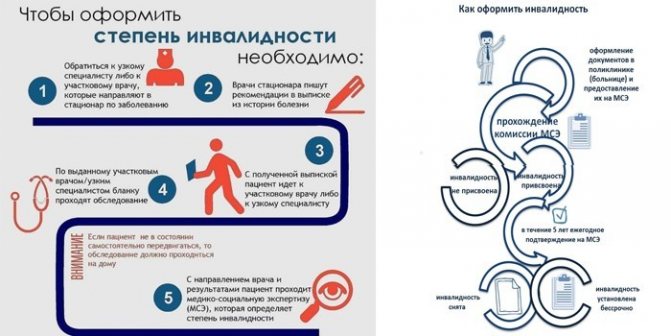
Based on the results of the examination, doctors draw up:
- Conclusion on assignment of a certain disability group. The document is stored in the ITU office for 10 years. In the conclusion, they must write a diagnosis listing all the diseases the pensioner has.
- Certificate with disability group. It is given to the patient. Disability can be lifelong or temporary. In the second case, the pensioner is required to undergo re-examination every 1-2 years (the date is on the certificate).
- Individual rehabilitation program (IPRA) listing the technical equipment that the patient will need.
Health problems are divided into 6 groups:
- Statodynamic. Ataxia, impairment of motor abilities due to limb amputation, complications after surgery, or congenital problems with the functions of the nervous system.
- Mental. This category includes epilepsy, mental retardation, schizophrenia, and other diseases related to neurology and psychiatry.
- Sensory. This category includes problems with vision, hearing, smell, increased sensitivity to pain or temperature fluctuations (body or environment).
- With respiratory, digestive, hematopoietic organs (asthma, tuberculosis, pulmonary heart failure, etc.).
- Speech. Nonverbal and verbal problems (with speech, self-expression).
- Physical pathologies (nanism, dwarfism, acromegaly, etc.).
After receiving disability, an elderly citizen or his official representative must submit documents to the Pension Fund of Russia, the department of social protection of the population to obtain compensation and benefits. Payments will be scheduled after 15 days.
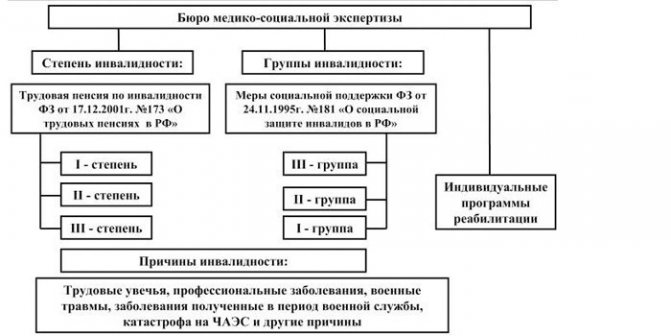
Social benefits
Disabled people are entitled to the following social preferences :
- Quotas for budget-funded educational places in higher educational institutions;
- Implementation of the “accessible environment” program in the country;
- If a disabled person wishes to find a job, he is provided with all possible assistance in this;
- Free professional training and retraining;
- Free provision of an employee from the social support service.
The listed social measures can make the life of a person suffering from a serious health disorder less difficult and smooth out the feeling of isolation from the rest of society.
Tax benefits
Legislation provides people with group I disabilities with tax benefits. They are in the nature of full or partial exemption from certain types of tax.
Property tax
property taxation :
- Living space.
- Land plot.
- Country house.
- Garage and other outbuildings.
- Commercial real estate – retail, industrial, related to the service sector.
A group I disabled person is exempt from paying property tax on any of the listed objects, with the exception of commercial premises.
An exception was made to prevent the use of fraudulent schemes with fictitious registration of commercial enterprises for disabled people, with the aim of leading them into the tax shadow. When a disabled person is a co-owner of housing or land, the tax benefit applies only to his share.
Transport tax
Group I disabled people are exempt from paying tax on vehicles they own. The same preference applies to the transport used to transport it, even if the disabled person himself does not drive it.
When applying for an MTPL car insurance policy, disabled people are legally provided with a 50% discount on the current tariff. A prerequisite is that the car should not have a power exceeding 100 hp.
Land tax
The first disability group gives the right to exemption from land tax . It applies to plots owned by the beneficiary and not exceeding 6 acres in size.
When the size of the land plot is greater than the established limit, the excess is taxed on a general basis.
Personal income tax benefits
Personal income tax is collected from all income received by citizens of the Russian Federation in the form of salaries, gifts, dividends, and from other financial sources. Its value is 13% of the amount received by a person.
Disabled people are no exception in this sense, and are also required to pay income tax. But for them the NKRF makes a number of exceptions.
Thus, the following income and things received as a gift are not subject to taxation
- Pension payments and benefits;
- Help from the employer, both material and monetary;
- One-time social payments;
- Funds received as a gift from charitable non-profit foundations;
- Vouchers to sanatoriums and health centers provided at a reduced price;
- Devices and equipment received as a gift intended for the social rehabilitation of a disabled person.
Method of receiving full additional payment
To receive the full amount of additional payments, the pensioner must refuse all existing social services.
The table shows the monetary equivalent amounts for each type of social service
| Type of social service | Cash equivalent amount, rubles |
| Supply of medicines according to the list established by law | 863 |
| Providing vouchers for treatment in sanatoriums | 133 |
| Preferential travel on ground transport | 124 |
Important! You can partially refuse the services of the NSO package: that is, for example, only vouchers to sanatoriums.
To refuse, an application is written in a special form to the Pension Fund of Russia, where it is considered.
An important point is the application deadline: they are officially set until October 1 of the current year. If you submit an application after the specified deadline, benefits will not be monetized. The monetization process itself will be carried out from January 1 next year.
Medical benefits
Medical benefits for disabled people of group I in Russia include :
- Service in medical institutions is out of priority.
- For disabled people who are deprived of the ability to move, the doctor is obliged to independently arrive at home when called.
- Travel to the place of treatment or rehabilitation is paid from budget funds.
Reimbursement of expenses for spa treatment
To undergo rehabilitation procedures in a sanatorium, persons with disability group I are entitled to free vouchers .
After this period, if there are further medical indications, they retain this privilege in the general set of social benefits. The costs of sanatorium-resort treatment are covered in this case from the federal budget.
Reimbursement of expenses for the purchase of drugs and prosthetics
Benefits for disabled people of group I provide for the free provision of medicines . This rule applies only to medications prescribed by a physician.
Another mandatory condition is that the medicine must be included in the list approved by government decree.
If a prescription drug is not on this list, then a disabled person has the right to receive a 50% discount when purchasing it. When purchasing prosthetics on their own, a disabled person can also count on a 50% discount on the cost.
Obtaining rehabilitation means
An integral part of the social rehabilitation of disabled people are technical devices and devices that increase their mobility and enable them to perform simple actions.
Disabled people of the first group who require the use of such devices to compensate for lost motor abilities can receive them free of charge.
Rehabilitation means include :
- Wheelchair, with mechanical or electric drive;
- Disabled cane;
- Crutches.
Who is entitled to additional payments?
All citizens who have lost their ability to work and have a disability group have the right to receive additional payments. The amount of additional payments depends on the established group.
Important! Additional payment will not be made if it is established that the person caused harm to one’s own health intentionally.
Categories eligible for pension subsidies:
- military veterans;
- pensioners with established disabilities;
- heroes of the USSR;
- citizens who suffered from repression;
- concentration camp prisoners;
- retired military personnel;
- soldiers who became disabled while performing their duties.
Housing benefits
Persons with disability group I who do not have a personal home, or when it does not meet the required level of safety according to construction or sanitary standards, have the right to count on the assistance of government bodies.
Improving living conditions
A number of disabled people are entitled to housing from the municipal fund on a social rental basis.
This opportunity is available to disabled people of group I, subject to the following conditions :
- The apartment is not designed to accommodate a person with this disability group. For example, there is no elevator in the entrance, and a wheelchair cannot pass through the doorways.
- The home is located in an area that is unfavorable from an environmental point of view.
- The apartment does not meet sanitary and hygienic standards.
- Several other families live in the apartment together with a group I disabled person (communal housing).
- A disabled person does not own a home, but rents it on a commercial basis from another citizen.
Benefits for paying for housing and communal services
Disabled people of the first group are entitled to a 50% discount on utility bills. This is a significant measure of financial support, given the constantly growing housing and communal services tariffs.
Benefits for disabled people of group I for utilities cover :
- Water supply;
- Sewerage;
- Electricity supply;
- Heating;
- Gas supply;
- Solid waste removal;
- Overhaul of the building.
Education and employment
Among the educational privileges it should be noted:
- Opportunity to obtain higher education free of charge.
- Enrollment in an educational institution in a budget department based on a quota, outside the general competition.
- Awarding an increased scholarship.
- Providing educational material in a form accessible to people with disabilities - remote learning, use of Braille, and so on.
Elena Smirnova
Pension lawyer, ready to answer your questions.
Ask me a question
A disabled person who is fully capable has the right to be employed at his own request. To do this, employment services select an organization for him with working conditions that meet the nature of his illness. He is hired under a quota system, without a probationary period.
The length of the working week for a disabled person of the first group cannot exceed 35 hours. The next paid vacation for him is at least 90 days annually.
Additional payment to a pensioner for dependents
If a disabled pensioner has dependents, he is entitled to a special additional payment for each of them.
Important! Dependents must not be older than 23 years old.
When calculating the amount of the surcharge, take into account the fact that the amount cannot exceed 1/3 of the pensioner’s base rate. The number of paid dependents cannot exceed 3 people.
If a disabled pensioner has military status, a cash allowance of 32% for each dependent is used for calculation. The maximum number of dependents is also limited to 3.
Providing benefits for bedridden disabled people
Disabled people who are unable to move independently are entitled to additional privileges from the state.
Providing a nurse
Providing a free nurse is possible if he does not have relatives capable of providing care. Care services are provided by a local social support worker.
Means of technical rehabilitation
Obtaining technical rehabilitation means. This list includes more than two hundred different devices , ranging from special prostheses to software.
Most common mistakes
Mistake #1.
A citizen applies to the bodies of the Pension Fund of the Russian Federation in order to calculate additional payments taking into account the personal and regional coefficient
A comment. According to current legislation, only one and increasing coefficients can be applied. You can choose a more profitable option from two types of surcharges.
Mistake #2.
A disabled pensioner has 4 dependent people. He asks for additional payment for all 4.
A comment. Only 3 dependents can be used to calculate surcharges under the current law. For 4th, 5th and further dependents, recounting cannot be carried out.
Benefits for persons caring for disabled people of the first group
Caring for a person with severe dysfunction of the musculoskeletal system or other serious health problems takes a lot of time and effort. To encourage citizens to take on this burden, the state has adopted a number of social measures.
These include:
- Tax preferences. Exemption from transport, property and land taxes;
- Free travel on intracity transport, except taxis;
- 50% discount on payment for housing and communal services and landline telephone.
When a disabled person travels to a sanatorium, the accompanying person receives a travel ticket, a place to stay in a medical institution and food at the expense of the state budget.


